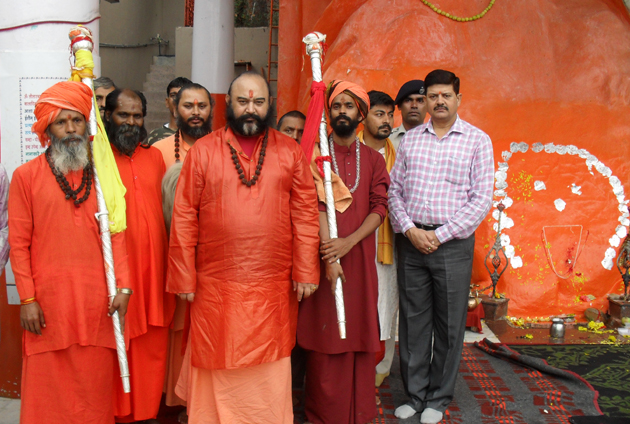SRINAGAR: ” Chharri Mubarak”, holy silver Mace of Lord Shiva, was today taken to ancient Sharika Bhawani Temple on the hills of Hari Parvat in the down town city to pay obeisance to the Goddess on the occasion of ‘Shravan Shukla Paksha Pradipada’, as per age-old traditions.
Chhari-Mubarak, one depicting Lord Shiva and another Goddess Parvati shall leave Shri Amareshwar Temple at Akhara Building Budshah Chowk near here for holy Amarnath cave shrine in south Kashmir Himalayas on August 13 to have final darshan on August 18, Nag Panchami “Rakshabandhan”.
However, the holy Mace will be kept at Amreshwar temple for darshan of devotees from August 5. ” Har Har Mahadev and Bum Bum Bolay” rented in the air when Mahant Deependra Giri, custodian of the holy Mace, carrying Chhari Mubarak left Deshnami Akhara this morning for Sharika Bhawani Temple on Hari Parvat hill, also known as Kohi-e-Maran, where the shrine of Hazrat Mehboob-ul-Aalam Sultan Arifeen is located on other and Gurdwara Chatipadshahi on the foothill.
Mahat Giri said the Mace was taken there as per age old traditions connected with annual Amarnath pilgrimage. He said Goddess ‘Sharika-Bhawani’ popularly known as ‘Tripursundari’, amongst the mystics is believed to be ‘Isht Devi’ (Presiding Deity) of the Srinagar city who manifested herself in a figure of ‘Shila’ (Holy Rock) at Hari-Parvat.
Sadhus, who participated in the pujan, also prayed for everlasting peace in State of Jammu & Kashmir. He said after ‘Chhari-Sthapana’ on of August 5, Holy Mace shall be kept in Shri Amareshwar Temple, for Darshan till it leaves for main course of pilgrimage on of August 13.
Traditional ‘Chhari-Pujan’ shall be performed on the occasion of ‘Nag-Panchami’ which falls on August 7, 2016 at Shri Amareshwar Temple. Yesterday the holy Mace was taken to Shankaracharya temple on the hill of Takhat-e-Suliman overlooking the world famous Dal Lake.
Over, 2.15 lakh pilgrims had paid obeisance till last night since the commencement of the 48-day-long annual pilgrimage from July 2 from both shortest Baltal and traditional Pahalgam tracks.


